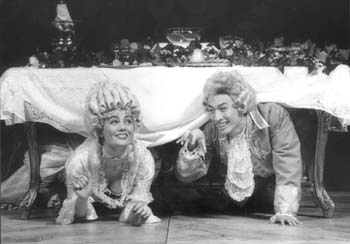![[Metroactive Stage]](/stage/gifs/stage468.gif)
[ Stage Index | Metro | Metroactive Central | Archives ]
Musing on Mozart
 Wilson Graham Not What Miss Manners Had in Mind: Constanze (Jessa Brie Berkner) breaks the rules of court decorum in 'Amadeus.' TheatreWorks explores the contradictions of creativity By Heather Zimmerman IF EVERY HUMAN BEING has a "spark of divinity," then Mozart was a full-blown blaze, according to rival composer Antonio Salieri in Peter Shaffer's Amadeus. The complex drama explores the nature of religion, of genius, and of art and its creation through the tragically--and perhaps suspiciously--short life of composer Wolfgang Amadeus Mozart. TheatreWorks stages a stirring production, with director Robert Kelley keeping tensions high and emotions intense in this speculative and darkly comic biography of a legend. The play chronicles the life of Mozart through the envious eyes of one of his contemporaries, Antonio Salieri (Joe Vincent), the court composer to Emperor Joseph II of Austria. Vincent is chillingly winning as the austere Salieri, exploring every inch of the fallible humanity that led the composer, as he freely admits, to have a hand in Mozart's early death. Having worked all his life to achieve his position, even making a deal with God--albeit a bit one-sided--to assure his musical success, Salieri finds his ardent belief in a benevolent deity exploded with the arrival in the emperor's court of the now-grown child prodigy Wolfgang Mozart (Francis Jue). An immature, foul-mouthed libertine, Mozart exhibits the very antithesis of the decorous behavior Salieri believed would win God's enduring favor, yet Mozart's talent eclipses Salieri's tenfold. As Mozart at his playful, ribald worst, Jue turns up the comic volume a bit high, but when the tortured core of his character begins to show through, he more than delivers with a portrait of a confused and alienated genius. Mozart's outrageous ways quickly lose him the mercurial court's patronage and goodwill. Although he's hardly a threat to Salieri's social position, Mozart's musical abilities far surpass the court composer's. Salieri comes to regard the crude but sublimely talented Mozart as the instrument of a cruel joke being played on him by a malicious God. Amadeus is not so much about the life of a composer as it is about the collapse or expansion of longstanding systems of belief: from Salieri's loss of devotion to his God, whom he viewed as a kind of ultimate muse, to Mozart's unconventional behavior, which flies in the face of the emperor's "divine right" to rule when Mozart proclaims that he wants his operas to celebrate the divine aspects of ordinary people. In Shaffer's ultimate example of the inevitability of destruction within creation, Salieri's urge to create music becomes a jealous desire to destroy his rival, and he uses Mozart's own creative impulses against him. For example, under the guise of friendship, Salieri advises the maverick composer to include subjects in an opera that would anger his last few supporters and effectively end his career. Surrounding the stage with fabric screens onto which silhouettes are projected, Eric Landisman's strikingly stark set replicates the artistic process as Shaffer presents it, encompassing the inspiring and daunting possibilities of an artist's blank canvas as well as the vast emptiness and loneliness that Mozart's genius imposes upon him, and also indirectly upon Salieri. Amadeus brims with tragicomic ironies: that one of the most-loved composers of all time perished in part because of petty pomposity and jealousy, and even that Salieri's final bid for immortality fizzles. However, Shaffer's tale of a man losing his religion does offer some unusual redemption, reaffirming the power of art as celebrating simultaneously the best and basest aspects of human nature. Salieri makes for a provocative antihero because his guiltiest secret is ultimately his humanity, laid bare by another's brilliant music.
Amadeus plays at the Mountain View Center for the Performing Arts, 500 Castro St., Mountain View; through Feb. 7, Tuesday at 7:30pm, Wednesday-Saturday at 8pm, plus Jan. 30 and Feb. 6 at 2pm, Sunday (Jan. 31) at 2 and 7pm, Sunday (Feb. 7) at 2pm; $25-$33. (650/903-6000) [ San Jose | Metroactive Central | Archives ]
|
From the January 28-February 3, 1999 issue of Metro.
Copyright © Metro Publishing Inc. Maintained by Boulevards New Media.